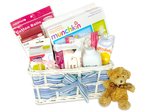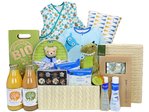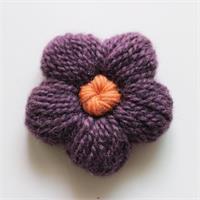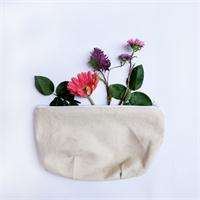If you are a mother-to-be or a new mother, you probably have heard from your female elders about "Sitting the Month", a Chinese tradition also known as postpartum confinement.
This traditional custom has been practiced by new mothers of numerous generations. They are refrained from taking showers, going outdoors, having visitors and more, during the first month of postpartum.
In short, Sitting the Month originated from Traditional Chinese Medicine, which believes postpartum women are more susceptible to cold air, which may put their body at risk for illnesses and delay their recovery time. As such, new mothers are advised to follow the mentioned traditions, and additionally avoid eating “cooling” foods, which may affect the body’s yin and yang balance. During the confinement month, new mothers are recommended to consume “hot” foods such as those cooked with ginger as these foods are thought to improve blood circulation.
Nutrition promotes postpartum healing
New mothers adhering to the zuoyuezi customs may practice in varying degrees. In fact, some new moms who do not believe in these traditions do not follow them at all.
Whether you plan to adhere to these traditions or not, nutrition plays a key role in providing energy, promoting healing and preventing illnesses during early months of postpartum. From a dietitian’s perspective, there are three essential nutrients for postnatal mothers: protein, iron and calcium.
Protein: To build and repair
Protein is important for recovering from childbirth. Whether you delivered naturally or via caesarean section, you have a wound. Protein promotes wound healing by helping the body to repair and build body cells.
Protein is found in meats, poultry, fish, seafood, eggs, tofu, beans, lentils, nuts, seeds and dairy products.
Tip: The amount of protein you need depends on your weight, but the general rule of thumb is to include at least one serving of protein with your meal and snack. To adopt healthier eating practices, choose leaner cuts of meats, fish, eggs, tofu, beans and lentils more often.
Iron: To prevent anemia
Iron plays a vital role in making red blood cells to carry oxygen to all parts of the body. Due to the growing fetus, some mothers develop a condition called iron deficiency anemia during the third trimester of pregnancy. Some may also become anemic due to losing a significant amount of blood during labour and delivery. In both instances, red blood cells become small, which makes carrying oxygen throughout the body challenging for those who are anemic.
Pregnant and postnatal women who have low iron may have pale looking skin and feel cold, weak and sluggish. Feeling tired and weak generally affects one’s mood, making them more irritable.
Fortunately, iron deficiency anemia can be reverted by eating protein-rich foods, which are also excellent sources of iron. The type of iron present, however, differs amongst animal and non-animal food sources. Heme iron, which is found in red meat, are easier for the body to absorb. Non-heme iron, on the other hand, is found in plant-based sources such as spinach, and beans, lentils, chickpeas and edamame. Tip: To ensure as much non-heme iron is absorbed as possible, eats foods with vitamin C, like citrus fruits, tomatoes, sweet potatoes, sweet bell peppers and broccoli along with the non-heme iron food.
Tip: To ensure as much non-heme iron is absorbed as possible, eats foods with vitamin C, like citrus fruits, tomatoes, sweet potatoes, sweet bell peppers and broccoli along with the non-heme iron food.
Calcium: To build strong bones
Calcium is an essential mineral for healthy bones and teeth, but you may be surprised to know that the developing baby in the womb takes calcium from your body to develop bones. To prevent osteoporosis, a condition where the body makes too little bone and/or loses too much bone, getting enough calcium during pregnancy and postpartum is important.
Dairy products like milk, yogurt and cheese are good sources of protein and excellent sources of calcium. Notably, cow’s milk has vitamin D added, which enhances the absorption of calcium.
Calcium is also present in foods like cooked spinach, almonds and legumes. Pair them with foods containing vitamin D, such as eggs, salmon and mackerel, to increase calcium absorption.
Tip: Drink at least 2 cups of 250mL milk per day along with eating foods with calcium. If you are lactose intolerant, choose fortified soy milk which has calcium and vitamin D added, and drink the same quantity as you would for cow’s milk.
What about traditional confinement foods?
Finally, you may wonder if there is a need to consume traditional confinement foods. From a dietitian’s perspective, while traditional confinement foods like pig’s feet consists of calcium, they are considered a high fat, high cholesterol food. Choosing dairy products like milk, yogurt and cheese may be a better option for getting calcium.
If you decide to eat traditional confinement foods, consult with a Traditional Chinese Medicine practitioner for further information.
Bottom line
Nourishing the body is imperative during the early postpartum days to promote recovery and strength. If you choose to breastfeed your baby, eating well is also key to maintain breastmilk quality and supply. Let’s explore this further in the next blog post. The Perks of Breastmilk – Would You Choose to Breastfeed Your Newborn Child?
This is a Hong Kong GGB original 'Sitting the Month – The Essential Nutrients for Postpartum Women ' blogpost.













 Share
Share Tweet
Tweet +1
+1  Pin it
Pin it Post
Post  Weibo
Weibo Review
Review


















 Diwali Gifts
Diwali Gifts 
 ▶
▶